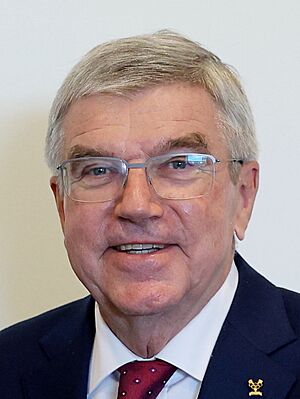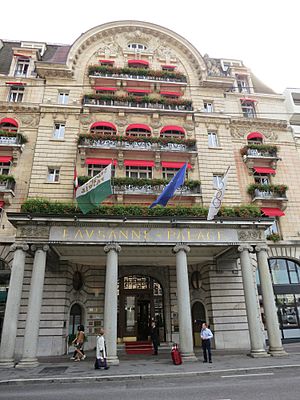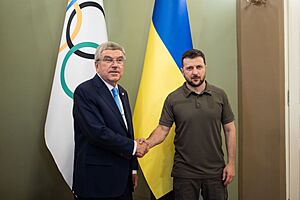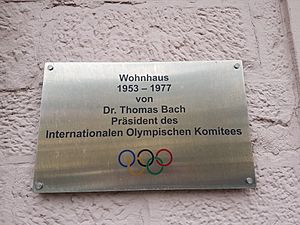Thomas Bach facts for kids
Quick facts for kids
Thomas Bach
|
|||||||||||||||||||||||||||||||||||||
|---|---|---|---|---|---|---|---|---|---|---|---|---|---|---|---|---|---|---|---|---|---|---|---|---|---|---|---|---|---|---|---|---|---|---|---|---|---|

Bach in 2024
|
|||||||||||||||||||||||||||||||||||||
| 9th President of the International Olympic Committee | |||||||||||||||||||||||||||||||||||||
| In office 10 September 2013 – 23 June 2025 |
|||||||||||||||||||||||||||||||||||||
| Preceded by | Jacques Rogge | ||||||||||||||||||||||||||||||||||||
| Succeeded by | Kirsty Coventry | ||||||||||||||||||||||||||||||||||||
| Honorary President of the International Olympic Committee | |||||||||||||||||||||||||||||||||||||
| Assumed office 23 June 2025 |
|||||||||||||||||||||||||||||||||||||
| President | Kirsty Coventry | ||||||||||||||||||||||||||||||||||||
| Personal details | |||||||||||||||||||||||||||||||||||||
| Born | 29 December 1953 Würzburg, Bavaria, West Germany |
||||||||||||||||||||||||||||||||||||
| Alma mater | University of Würzburg (Dr. iur. utr.) | ||||||||||||||||||||||||||||||||||||
| Profession | Lawyer | ||||||||||||||||||||||||||||||||||||
| Signature | |||||||||||||||||||||||||||||||||||||
|
|||||||||||||||||||||||||||||||||||||
Thomas Bach (born 29 December 1953) is a German lawyer and a former foil fencer. He won an Olympic gold medal in fencing. From 2013 to 2025, he was the ninth President of the International Olympic Committee (IOC). He was the first Olympic champion to be chosen for this important role. Since June 2025, he has been the Honorary President of the IOC.
Contents
Early Life and School
Thomas Bach was born in Würzburg, Germany. He grew up in Tauberbischofsheim until 1977. He studied law at the University of Würzburg and earned a special law degree in 1983. Besides German, his first language, he also speaks French, English, and Spanish very well.
Fencing Career Highlights
Thomas Bach was a skilled foil fencer for West Germany. In 1971, at just 17 years old, he won the German national junior foil championship. He also earned a bronze medal at the Junior World Fencing Championships.
World and Olympic Medals
Bach won several medals at the World Fencing Championships. He earned a team silver medal in 1973 and a team gold medal in 1977. He also won a team bronze medal in 1979.
His biggest achievement was winning a foil team gold medal at the 1976 Summer Olympics in Montreal, Canada. In 2017, he was officially allowed to use the letters "OLY" after his name. This is a special honor for Olympians.
Nationally, Bach was the German Individual Foil Champion in 1977 and 1978. He also helped his team win the European Cup of Champions in 1978.
Leading German Sports
Before leading the IOC, Thomas Bach was the President of the German Olympic Sports Confederation (DOSB). He held this position from 2006. To run for the IOC Presidency, he stepped down from the DOSB in September 2013. He remained a member of the DOSB Executive Board.
In 2012, Bach helped Munich try to host the 2018 Winter Olympics. However, Pyeongchang, South Korea, was chosen as the host city.
Becoming IOC President

On 9 May 2013, Thomas Bach announced he would run for President of the International Olympic Committee (IOC).
The 2013 Election
Bach was elected as IOC President for an eight-year term on 10 September 2013. This happened at the 125th IOC Session in Buenos Aires. He received the most votes in the final round. He took over from Jacques Rogge, who had been President since 2001.
Bach was able to run for a second four-year term in 2021. He was re-elected on 10 March 2021, with a large majority of votes. This was his final term as IOC President, as the rules limit the president's time in office. He stepped down in June 2025.
Olympic Agenda 2020
After becoming President, Bach wanted to improve how cities bid to host the Olympics. He also wanted to make sure the Olympics were more sustainable. He felt the old bidding process asked too much too soon. These ideas became known as Olympic Agenda 2020. All forty of his suggested changes were approved in 2014.
Choosing Olympic Host Cities

The first city chosen under Thomas Bach's leadership was Beijing for the 2022 Winter Olympics. This decision was made in July 2015. Lausanne was also chosen to host the 2020 Winter Youth Olympics at the same time.
For the 2024 Summer Olympics, Bach suggested a new idea. Instead of choosing just one city, he proposed awarding both the 2024 and 2028 Summer Olympics at once. This happened because several cities had dropped out of the bidding. The IOC agreed, and Paris was chosen for 2024, with Los Angeles for 2028. Both cities were chosen without any opposing votes.
Later, Milan and Cortina d'Ampezzo in Italy were chosen to host the 2026 Winter Olympics in 2019.
Challenges and Decisions
Dealing with Russia
One big challenge for Bach was dealing with Russia's doping scandal. It was found that Russia had cheated with drug tests at the 2014 Winter Olympics. The government had also overseen widespread doping among Russian athletes. Bach spoke about respecting rules and staying clean at the 2018 Winter Olympics.
Bach has also supported Russian and Belarusian athletes being able to compete in the 2024 Summer Olympics. He believes that national governments should not decide who can participate in international sports. In October 2023, the IOC suspended the Russian Olympic Committee. This was because Russia had included sports groups from parts of Ukraine into their own. Russia tried to challenge this decision but failed.
Postponing the Tokyo Olympics
In March 2020, the COVID-19 pandemic caused concerns about the 2020 Summer Olympics in Tokyo, Japan. At first, the IOC said they weren't thinking about canceling or postponing. However, later that month, the IOC changed its mind. The 2020 Games were rescheduled and took place from 23 July to 8 August 2021.
During his visit to Tokyo in July 2021, Bach accidentally referred to Japanese people as "Chinese." This caused some upset on social media. His visit to the Hiroshima Peace Memorial Park was also met with some opposition. Some people felt he was using the historic place to justify holding the Olympics during the pandemic.
Peng Shuai and the 2022 Winter Olympics
In 2021, Chinese tennis player Peng Shuai seemed to disappear after making a serious accusation against a top official. After many people around the world expressed concern, a video was released. In the video, Thomas Bach interviewed Peng, who said she was safe. Peng later attended events at the 2022 Winter Olympics and met with Bach again.
Olga Kharlan Incident

In July 2023, Ukrainian fencer Olga Kharlan was disqualified from a World Fencing Championship match. This happened because she did not shake her Russian opponent's hand after winning. Instead, she offered to tap blades, which was allowed by fencing rules at the time. The next day, Thomas Bach stepped in. He sent Kharlan a letter showing his support and guaranteed her a spot in the 2024 Summer Olympics. He said he understood her difficult situation due to the war in her country.
Artistic Swimming Name Change
In 2017, Bach faced some criticism for changing the name of "synchronized swimming" to "artistic swimming." Many people who loved the sport signed a petition against the change.
Awards and Honors
Thomas Bach has received many honors from different countries and organizations.
State Honors
 Greece: Grand Cross of the Order of the Phoenix
Greece: Grand Cross of the Order of the Phoenix Poland: 1st Class of the Order of Merit of the Republic of Poland
Poland: 1st Class of the Order of Merit of the Republic of Poland Russia: Order of Honour
Russia: Order of Honour South Korea: Blue Dragon (Cheongnyong) of the Order of Sports Merit
South Korea: Blue Dragon (Cheongnyong) of the Order of Sports Merit Tunisia: Grand Cordon of the National Order of Merit (2016)
Tunisia: Grand Cordon of the National Order of Merit (2016) Ukraine: 5th Class and 4th Class of the Order of Prince Yaroslav the Wise
Ukraine: 5th Class and 4th Class of the Order of Prince Yaroslav the Wise Japan: Grand Cordon of the Order of the Rising Sun (2025)
Japan: Grand Cordon of the Order of the Rising Sun (2025)
Special Awards
- He received the Seoul Peace Prize from South Korea.
- In 2025, he was awarded the Gold Olympic Order, which is a very high honor in the Olympic movement.
See also
 In Spanish: Thomas Bach para niños
In Spanish: Thomas Bach para niños
 | Lonnie Johnson |
 | Granville Woods |
 | Lewis Howard Latimer |
 | James West |



